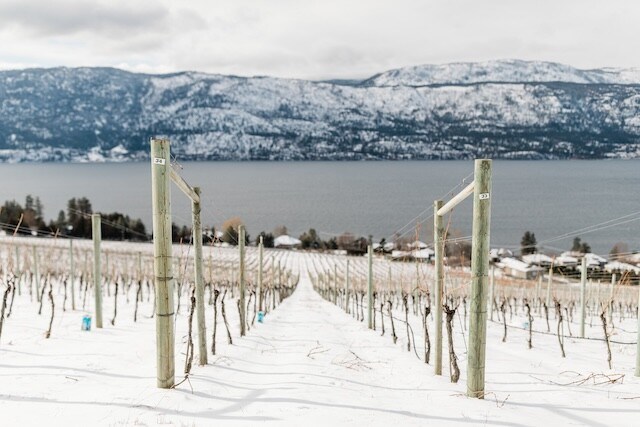
Wine Culture Magazine

A frigid winter hurt B.C.’s wine country this past year. Wine Growers British Columbia photo
It’s too early to tell yet exactly how much damage was done during the January cold snap that hit the Okanagan-Similkameen, but early models show crops yields could be decimated this year.
Despite the setbacks the past few years, a recent study published in the journal Nature suggests the long term prospects for the Okanagan, and other parts of B.C. are good compared to what climate change could do in other wine growing regions of the world.
Researchers say places like California and the south of France could become unsuitable for high-quality wine production if annual average temperatures continue to climb at their current rate. However, British Columbia could be an area of expansion due to a warming climate.
“But, it’s important to also keep in mind that some cool climate regions are kind of known for a particular wine style. So that could mean that that wine style would change. Maybe that’s not something that growers really want either.”
Gambetta says the bottom line is everything has to be economically sustainable.
The report in Nature says that northernmost wine regions of North America, including B.C., Washington State, Oregon, the Great Lakes region and New England are likely to shift from cool to intermediate, or even warm, climate viticulture in the future. “thus increasing their potential for premium wine production. However, global warming surpassing 2 °C is likely to result in antagonistic effects.
“On one hand, it can enhance climate suitability, with suitable areas in these regions (excluding Oregon) probably more than doubling. On the other hand, it would introduce unprecedented risks of heatwaves and increased disease pressure, particularly considering that these regions are predominantly classified as humid.”
What scientists can’t predict is extreme short term events like the cold snaps of the past two winters in the Okanagan-Similkameen, the heat dome of 2021 or wildfires. Stanley cautions against knee-jerk reactions to recent events.
“There’s a lot of talk about pulling things out and putting other varieties in, and doing radical things. I would caution everybody to not to really jump on that bandwagon just yet and just see how this plays out over the next couple of years.”
Gambetta says growers should be looking to adopt some of the practices that are working in areas of the globe with the types of climate conditions we could see in future decades.
—This story by Cindy White originally appeared on Castanet

Vitis is is an indispensable seasonal guide for vintners, sommeliers and weekend imbibers alike that is dedicated to British Columbia’s rapidly evolving wine culture.

Vitis is is an indispensable seasonal guide for vintners, sommeliers and weekend imbibers alike that is dedicated to British Columbia’s rapidly evolving wine culture.
@ Vitis Magazine